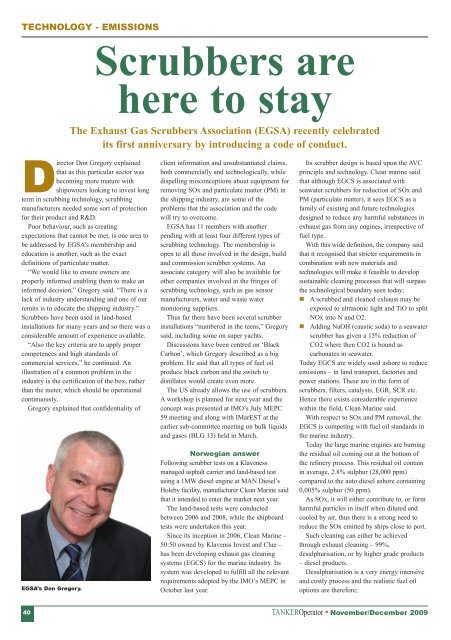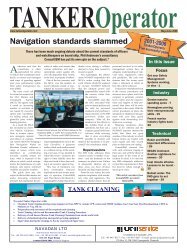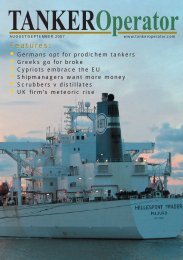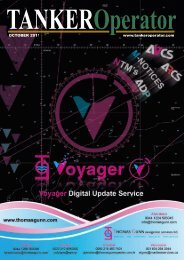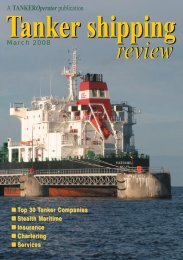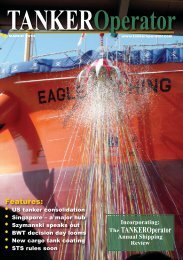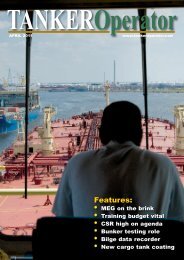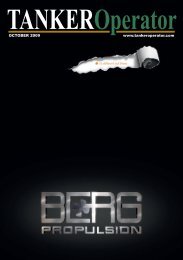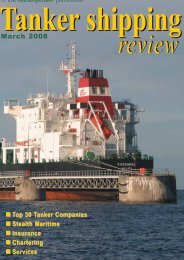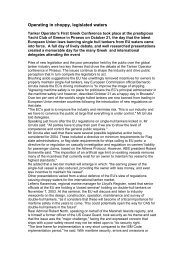Features: - Tanker Operator
Features: - Tanker Operator
Features: - Tanker Operator
You also want an ePaper? Increase the reach of your titles
YUMPU automatically turns print PDFs into web optimized ePapers that Google loves.
TECHNOLOGY - EMISSIONS<br />
Scrubbers are<br />
here to stay<br />
The Exhaust Gas Scrubbers Association (EGSA) recently celebrated<br />
its first anniversary by introducing a code of conduct.<br />
Director Don Gregory explained<br />
that as this particular sector was<br />
becoming more mature with<br />
shipowners looking to invest long<br />
term in scrubbing technology, scrubbing<br />
manufacturers needed some sort of protection<br />
for their product and R&D.<br />
Poor behaviour, such as creating<br />
expectations that cannot be met, is one area to<br />
be addressed by EGSA’s membership and<br />
education is another, such as the exact<br />
definitions of particulate matter.<br />
“We would like to ensure owners are<br />
properly informed enabling them to make an<br />
informed decision,” Gregory said. “There is a<br />
lack of industry understanding and one of our<br />
remits is to educate the shipping industry.”<br />
Scrubbers have been used in land-based<br />
installations for many years and so there was a<br />
considerable amount of experience available.<br />
“Also the key criteria are to apply proper<br />
competences and high standards of<br />
commercial services,” he continued. An<br />
illustration of a common problem in the<br />
industry is the certification of the box, rather<br />
than the meter, which should be operational<br />
continuously.<br />
Gregory explained that confidentiality of<br />
EGSA’s Don Gregory.<br />
client information and unsubstantiated claims,<br />
both commercially and technologically, while<br />
dispelling misconceptions about equipment for<br />
removing SOx and particulate matter (PM) in<br />
the shipping industry, are some of the<br />
problems that the association and the code<br />
will try to overcome.<br />
EGSA has 11 members with another<br />
pending with at least four different types of<br />
scrubbing technology. The membership is<br />
open to all those involved in the design, build<br />
and commission scrubber systems. An<br />
associate category will also be available for<br />
other companies involved in the fringes of<br />
scrubbing technology, such as gas sensor<br />
manufacturers, water and waste water<br />
monitoring suppliers.<br />
Thus far there have been several scrubber<br />
installations “numbered in the teens,” Gregory<br />
said, including some on super yachts.<br />
Discussions have been centred on ‘Black<br />
Carbon’, which Gregory described as a big<br />
problem. He said that all types of fuel oil<br />
produce black carbon and the switch to<br />
distillates would create even more.<br />
The US already allows the use of scrubbers.<br />
A workshop is planned for next year and the<br />
concept was presented at IMO’s July MEPC<br />
59 meeting and along with IMarEST at the<br />
earlier sub-committee meeting on bulk liquids<br />
and gases (BLG 13) held in March.<br />
Norwegian answer<br />
Following scrubber tests on a Klaveness<br />
managed asphalt carrier and land-based test<br />
using a 1MW diesel engine at MAN Diesel’s<br />
Holeby facility, manufacturer Clean Marine said<br />
that it intended to enter the market next year.<br />
The land-based tests were conducted<br />
between 2006 and 2008, while the shipboard<br />
tests were undertaken this year.<br />
Since its inception in 2006, Clean Marine –<br />
50:50 owned by Klavenss Invest and Clue –<br />
has been developing exhaust gas cleaning<br />
systems (EGCS) for the marine industry. Its<br />
system was developed to fulfill all the relevant<br />
requirements adopted by the IMO’s MEPC in<br />
October last year.<br />
Its scrubber design is based upon the AVC<br />
principle and technology. Clean marine said<br />
that although EGCS is associated with<br />
seawater scrubbers for reduction of SOx and<br />
PM (particulate matter), it sees EGCS as a<br />
family of existing and future technologies<br />
designed to reduce any harmful substances in<br />
exhaust gas from any engines, irrespective of<br />
fuel type.<br />
With this wide definition, the company said<br />
that it recognised that stricter requirements in<br />
combination with new materials and<br />
technologies will make it feasible to develop<br />
sustainable cleaning processes that will surpass<br />
the technological boundary seen today;<br />
A scrubbed and cleaned exhaust may be<br />
exposed to ultrasonic light and TiO to split<br />
NOx into N and O2.<br />
Adding NaOH (caustic soda) to a seawater<br />
scrubber has given a 15% reduction of<br />
CO2 where then CO2 is bound as<br />
carbonates in seawater.<br />
Today EGCS are widely used ashore to reduce<br />
emissions – in land transport, factories and<br />
power stations. These are in the form of<br />
scrubbers, filters, catalysts, EGR, SCR etc.<br />
Hence there exists considerable experience<br />
within the field, Clean Marine said.<br />
With respect to SOx and PM removal, the<br />
EGCS is competing with fuel oil standards in<br />
the marine industry.<br />
Today the large marine engines are burning<br />
the residual oil coming out at the bottom of<br />
the refinery process. This residual oil contain<br />
in average, 2.8% sulphur (28,000 ppm)<br />
compared to the auto diesel ashore containing<br />
0,005% sulphur (50 ppm).<br />
As SOx, it will either contribute to, or form<br />
harmful particles in itself when diluted and<br />
cooled by air, thus there is a strong need to<br />
reduce the SOx emitted by ships close to port.<br />
Such cleaning can either be achieved<br />
through exhaust cleaning – 99%,<br />
desulphurisation, or by higher grade products<br />
– diesel products.<br />
Desulphurisation is a very energy intensive<br />
and costly process and the realistic fuel oil<br />
options are therefore;<br />
40<br />
TANKER<strong>Operator</strong> November/December 2009


